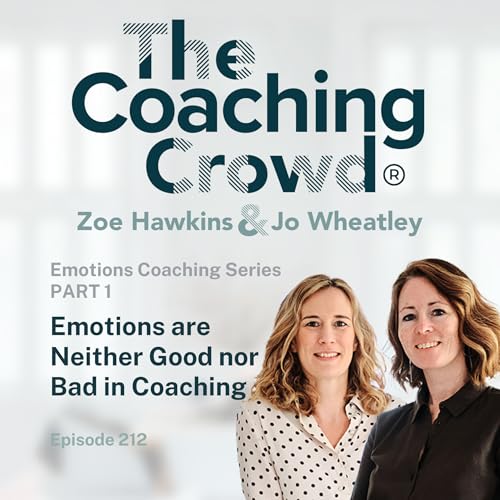
Emotions are Neither Good nor Bad in Coaching
Failed to add items
Add to basket failed.
Add to Wish List failed.
Remove from Wish List failed.
Follow podcast failed
Unfollow podcast failed
-
Narrated by:
-
By:
About this listen
Have you ever caught yourself labelling your emotions as either good or bad, and wondered how that shapes the way you coach or experience life?
In this episode of the podcast we begin a six-part series exploring the six principles of emotions coaching, drawn from our Emotions Coaching Practitioner Training. We open with the very first principle: Emotions are neither good nor bad.
Too often, we attach labels to our feelings. We might view stress or anxiety as “bad” and chase after happiness as “good.” But when we categorise emotions in this way, we miss out on their deeper value. In our conversation, Jo and I share how emotions become defined not by their presence, but by the beliefs we attach to them.
Zoe reflects on her own journey of recognising anxiety, an emotion she once denied, and how opening space for it led her to new levels of self-awareness and healthier strategies. We also discuss how coaches can inadvertently get pulled into their clients’ “get away from” energy, and how holding space with neutrality invites curiosity, possibility, and transformational growth.
Throughout this episode, we show why suspending judgement around emotions is one of the most powerful coaching tools you can bring to your practice. Rather than trying to “fix” a client’s feelings, emotions coaching creates the conditions for richer insight, more authentic self-connection, and ultimately, greater transformation.
Timestamps:
- 00:30 – Introducing the six-part emotions coaching series
- 00:57 – What it means that emotions are neither good nor bad
- 02:20 – How clients bring emotions into coaching sessions
- 03:35 – The role of neutrality and curiosity in coaching
- 06:19 – Zoe’s personal experience of recognising anxiety
- 08:39 – Why emotions carry wisdom and strategies
- 13:16 – Coaching conversations around anger and fear
- 16:38 – Boundaries, aggression, and coaching at the root cause
- 18:40 – Why emotions coaching is not “fluffy” but deeply transformational
- 21:01 – The power of startling questions in coaching
- 22:00 – How to develop your own emotions coaching toolkit
Key Lessons Learned:
- Labelling emotions as good or bad prevents us from accessing their full value.
- Curiosity and neutrality allow clients to explore emotions without fear or resistance.
- Denying emotions (like anxiety or anger) can cause them to resurface in unhelpful ways.
- Emotions often carry wisdom, strategies, and insight when welcomed rather than avoided.
- Coaches add transformational depth by holding space for emotions instead of rushing to “fix” them.
- Leaders, executives, and clients alike benefit from having permission to explore emotions beyond surface goals.
Keywords:
Emotions coaching, Coaching principles, Neutrality in coaching, Transformational coaching, Coaching and anxiety, Emotional intelligence coaching, Anger in coaching conversations, Coaching for leaders, Stress and coaching practice, Emotions are neither good nor bad,
Links & Resources:
- http://www.igcompany.com/emotionscoaching


